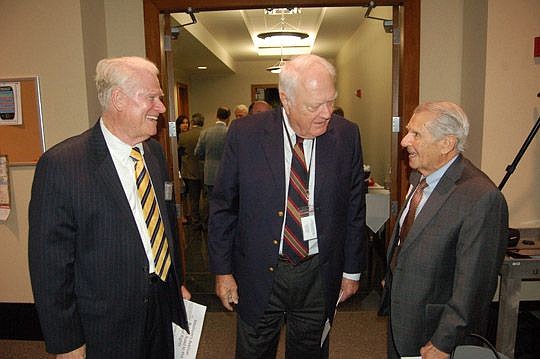
“We the people.”
Those three words — penned in large letters at the top of the U.S. Constitution — form the foundation of America’s government.
Equally important is the Bill of Rights, the first 10 amendments to the Constitution. They guarantee individual liberty and form the foundation of the U.S. legal system.
To recognize Sept. 17, the date in 1787 the Constitution was adopted, the Jacksonville chapter of the Federal Bar Association invited U.S. District Judge Timothy Corrigan to share Thursday some of what he has learned about James Madison.
Madison wrote the draft of the Bill of Rights and later was elected the fourth president of the United States.
“As lawyers and judges, not a day goes by that we don’t encounter the Constitution,” said Corrigan.
He also pointed out that without the Constitution, lawyers and judges wouldn’t have jobs.
Corrigan said he became even more interested in the Constitution in April when he attended a judicial conference in Philadelphia and toured the National Constitution Center.
Two weeks ago, he visited Montpelier in Orange County, Va., the plantation home of James and Dolley Madison.
Madison wrote the first draft of the Bill of Rights in his study on the second floor of the home. During the Constitutional Convention, his knowledge of various forms of government placed him at an advantage over the other members of the convention.
“He was the most prepared guy in the room,” said Corrigan.
After four months of debate, there was a motion for an addition that would serve to preserve individual liberty and states’ rights. It failed, but after much discussion, the members agreed a Bill of Rights would be added to the Constitution.
Corrigan said Madison didn’t think much of the plan, but went along with it in order to avoid rewriting the Constitution. Madison decided he would draft the bill because he wanted to control its content.
Like other legal documents, aspects and language were amended before the Bill of Rights finally was ratified in 1791. Some of the changes to Madison’s original text warrant close review and consideration in terms of how the 224-year-old Bill of Rights is interpreted and implemented today.
For example, Madison’s draft of the 2nd Amendment placed the right of the people to bear arms first and a well-armed militia second. But that isn’t what’s in the Bill of Rights.
“They flipped the 2nd Amendment,” Corrigan said.
Had Madison’s version been ratified, “would we interpret it differently?” he added.
Madison’s draft also included the right of conscientious objection.
“No person religiously scrupulous of bearing arms shall be compelled to render military service in person,” he wrote.
That part didn’t make it into the 2nd Amendment, but now is considered law.
Madison also wanted each member of Congress to represent only 30,000 constituents. That was changed to create a 434-member Congress, each of whom currently represents about 670,000 constituents.
“If James Madison got his way, the House of Representatives would have 20,000 members,” Corrigan said. “He didn’t quite envision the country we would become.”
Madison also had a sense of humor.
While he was secretary of state when Thomas Jefferson was president, the government entertained a representative of the Barbary Pirates, who traditionally traveled with concubines.
Asked by Jefferson if he thought the government should pay for the companions, Madison said yes.
“He said it was ‘an appropriation for foreign intercourse,’” Corrigan said. “Jefferson was not amused.”
(904) 356-2466